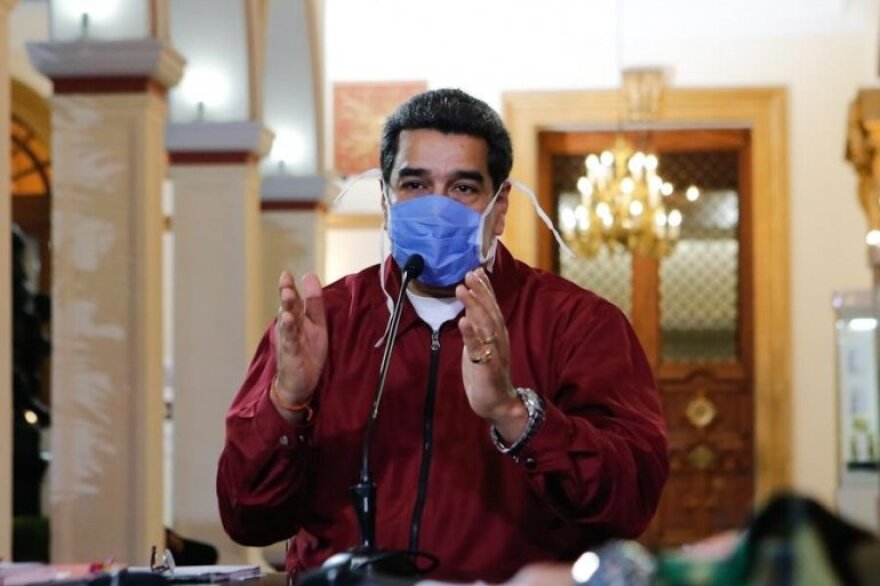Since COVID-19 is a global pandemic, more Americans are asking a relevant question: In life-and-death emergencies like this, should the U.S. loosen economic sanctions against countries like Cuba, Iran – and especially Venezuela?
WLRN depends on donors to remain South Florida’s leading nonprofit, most trusted source of news and information. Support our mission by giving monthly as a sustaining member of Friends of WLRN or make a one-time donation of your choice. Thank you. Click here to give.
More Venezuelans are struggling with the issue, too.
“Part of me wonders if the U.S. shouldn’t ease the sanctions,” says Claudia Martínez, who lives in Valencia, Venezuela, with her husband and three kids — a usually middle-class family that is just scraping by this month.
Venezuela is suffering the worst economic collapse in the world today, and like most Venezuelans, Martínez desperately wants a change of government. U.S. economic sanctions sometimes make their daily struggle even harder. Nontheless, Martínez has supported them — including cutting off vital sales of Venezuelan oil to the U.S. — because she’d hoped the pressure would drive out the authoritarian regime of President Nicolás Maduro.
But right now she suddenly feels conflicted.
“Things are worse than usual now,” she says. “No work, no food, no money and especially no gasoline. Because of this crisis I’m having to sell candy on the streets so we can live.”
READ MORE: In Coronavirus Storm, Latin America & Caribbean a Sea of Relative Calm. Will It Last?
The crisis is COVID-19. As of Monday, Venezuela reported only 77 cases of the new coronavirus and no deaths. But Venezuela’s financial ruin has left its healthcare in ruin — so Maduro essentially has had no choice but to lock down the country.
That’s deepening Venezuela’s economic disaster, especially since global oil prices are hitting 17-year lows. And since COVID 19 has forced the border with neighboring Colombia to close, it’s harder for folks like Martínez now to find the dollars they need since Venezuela’s currency, the bolívar, is worthless.
“They just significantly raised our tax rates to raise more revenue,” Martínez says, referring to a large, surprise hike by the government last week. “The impact of all this is terrible.”
I want to see Maduro go, I think that Maduro is a dictator. But that doesn't mean that the only solution is to starve Venezuelans to death. –Francisco Rodriguez
On Sunday, Maduro's government ordered the temporary, nationwide suspension of rent and credit payments. But that's unlikely to to prevent a steeper downturn — one that could also make it doubly difficult for Venezuela to confront the deadly coronavirus scourge.
As a result, many Venezuelans are beginning to feel the U.S. should loosen sanctions, at least until COVID-19 subsides. More Venezuelan Americans feel that way, too.
“What is the goal?” asks Angelica Sanchez, 25, who works in music marketing in Miami. “Is the goal to help the [Venezuelan] people or is the goal just to make a political stance?”
Sanchez was born in Venezuela and still has several relatives living in Caracas. She says their suffering has just gotten sharper in recent weeks.
“Already the situation was really dire,” she says. “Even on good days you depend on a few people to help you or to collectively buy goods to then share amongst each other. And so then anything that makes it more difficult to buy products is going to push people deeper into the hole of economic despair there.”
REGIME BYPASS
But there are still many voices in the U.S. and in Venezuela who warn that loosening sanctions may instead result in more suffering. They fear any financial lifeline meant for Venezuelans would just be pocketed by Maduro’s corrupt regime and make that regime stronger.
“We doubt any help or relief from the U.S. will get to the Venezuelan people,” says María Eugenia de Mendoza, a doctor in San Cristóbal, Venezuela. “It will just be intercepted by the hands of the regime.”

To support that concern, Mendoza points out that at the private hospital where she works, more people are coming with coronavirus-like symptoms — but doctors there have few testing kits because, she says, government officials have appropriated many of them, often for public clinics usually serving regime loyalists. (She hopes that will change when more test kits arrive from China this week.)
Many economists say the solution is an international mechanism to bypass the regime.
Francisco Rodríguez is a Venezuelan economist who teaches at Tulane University in New Orleans and runs the nonprofit foundation Oil for Venezuela. He urges letting Venezuela sell some oil to the U.S. — with payment coming directly in food and medicine. As for delivering it to Venezuelans:
“I share that concern that the government’s going to get its hands on it,” says Rodríguez. “So then the government doesn’t need to handle those resources. You can set up a system that is monitored either internationally or by an alternative power.”
Rodríguez points out the U.S. recognizes opposition leader Juan Guaidó as Venezuela’s legitimate president, not Maduro. Venezuelans associate Guaidó to a large degree with the U.S. sanctions. So a big risk is that if sanctions make Venezuelans suffer more during COVID-19, Guaidó’s popular standing could suffer, too.
“I want to see Maduro go, I think that Maduro is a dictator,” says Rodríguez. “But that doesn’t mean that the only solution is to starve Venezuelans to death. Whatever your opinion of sanctions was before COVID-19, this is the moment to stop.”
International aid groups like the Red Cross have strained to convince Maduro to let them bring in and food and medicine aid independently. But the regime has been reluctant at best to allow it.
That’s a big reason the Trump administration isn’t likely to loosen sanctions. For now the U.S. is betting an even deeper economic crisis will achieve what the sanctions have not: Maduro’s downfall.



